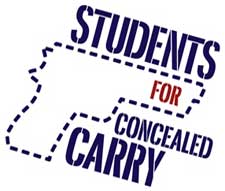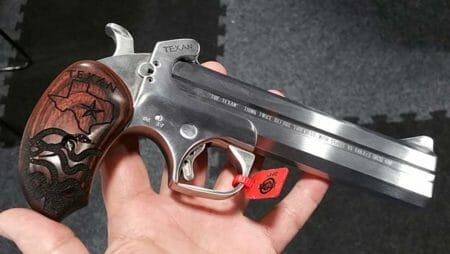

Austin, TX -(AmmoLand.com)- This past Friday, Students for Concealed Carry released a lengthy statement (https://is.gd/TA7hPR) explaining why two of the rules proposed by the campus carry policy working group at the University of Texas at Austin are ill-conceived and contrary to both the letter and intent of the state’s new campus carry law (Texas Senate Bill 11).
However, even at 1,500 words, that release wasn’t long enough to describe every problem inherent in those two proposals.
As detailed in SCC’s previous release, the working group’s proposal that university employees be allowed to designate their offices as criminally enforceable “gun-free” zones would ensure that any concealed handgun license holder required to visit a “gun-free” office as part of his or her daily duties as a university employee, research assistant, or teaching assistant would be unable to lawfully carry a concealed handgun on campus. This proposal is all the more egregious in that it would bestow upon academics a right not enjoyed by any other state employee—the right to arbitrarily criminalize licensed concealed carry on state property. UT’s campus carry working group, which comprises mostly university employees, has decided that university employees are deserving of a right not granted to state agency employees, county employees, municipal employees, state legislators, or any member of the state’s executive branch, including the governor and lieutenant governor.
As explained in SCC’s earlier statement, the working group’s proposal that any license holder carrying a semiautomatic handgun be required to carry the gun without a round in the chamber conflicts with the generally accepted best practices taught by every firearms school, police academy, and military branch in the nation. This proposal is ostensibly intended to prevent the accidental/negligent discharge of a license holder’s firearm; however, not one of the U.S. college campuses that currently allow licensed concealed carry has seen an accidental/negligent discharge of a holstered firearm. In fact, such incidents are virtually unheard of anywhere.
The working group’s report cites four on-campus accidental/negligent discharges, none of which involved a holstered firearm and none of which resulted in life-threatening injuries. Two of the incidents involved individuals (one a cadet at a police academy and one a staff member at a dental school) showing their weapons to classmates or coworkers. The other two involved license holders (one professor and one student) each carrying a handgun in a pants pocket, without a holster (a practice widely acknowledged by experts to be unsafe because a foreign object or finger can inadvertently engage the trigger).
The cause of the first two incidents is addressed by the state’s new campus carry law, which dictates that intentionally displaying a handgun on a college campus will be a Class A misdemeanor, punishable by up to one year in jail, a fine of up to $4,000, and a mandatory five-year revocation of the offender’s license to carry a handgun. The cause of the second two incidents is addressed by the working group’s proposed requirement that each handgun be carried in a holster that covers the trigger guard (a reasonable requirement that mirrors the generally accepted best practices for carrying a handgun).
Because the working group’s proposed empty-chamber policy contradicts basic firearms training in order to address a concern that is already addressed in other, more reasonable ways, it is both superfluous and dangerous. In addition to the dangers listed in SCC’s previous release, such a policy would greatly complicate the deployment of a license holder’s handgun during an active-shooter situation. Under such circumstances, a license holder would have two choices: 1) Wait until confronted by the shooter to load the chamber, potentially denying the license holder adequate time to respond, or 2) Draw the weapon and chamber a round prior to actually encountering the shooter, potentially causing confusion among bystanders and/or first responders. Even if the license holder were hiding alone in an office, classroom, or closet, the distinctive sound of a round being loaded into the chamber of a gun could alert a gunman to the license holder’s hiding place (and to the fact that the license holder is armed) or give bystanders and first responders the mistaken impression that the person hiding there is actually the gunman.
If UT’s campus carry working group intended to ensure that handguns remain holstered, the group seriously erred in proposing this empty-chamber requirement. SCC’s previous statement explains how this rule would almost certainly result in license holders manipulating their firearms in private automobiles parked on campus (something state law says universities can’t stop license holders from doing), but there is also a legitimate concern that this policy might make license holders quicker to unholster their guns when faced with an unidentified or unconfirmed threat.
A license holder who learns that a gunman has been reported nearby might be tempted to try to surreptitiously (without intentionally displaying the weapon) draw his or her handgun and chamber a round (in violation of school policy but not state law) so as to better prepare himself or herself to respond to a threat. Such an action would greatly increase the odds of an accidental/negligent discharge, a dangerous misunderstanding (i.e., the license holder being mistaken for the reported gunman), or both. In short, the working group’s proposed empty-chamber rule has the potential to turn a false alarm into a tragedy.
Most of the policies proposed by UT’s campus carry working group are reasonable and in keeping with both the letter and intent of Texas Senate Bill 11. However, the gun-free-offices provision and the empty-chamber provision are neither reasonable nor in keeping with the law.
Supporters of the law will spare no effort or expense to see those provisions struck down.
About Students for Concealed Carry:
Students for Concealed Carry (SCC) is a national, non-partisan, grassroots organization comprising college students, faculty, staff, and concerned citizens who believe that holders of state-issued concealed handgun licenses should be allowed the same measure of personal protection on college campuses that current laws afford them virtually everywhere else. SCC is not affiliated with the NRA or any other organization. For more information on the debate over campus carry in Texas, visit WhyCampusCarry.com.
For more information on SCC, visit ConcealedCampus.org or Facebook.com/ConcealedCampus.


